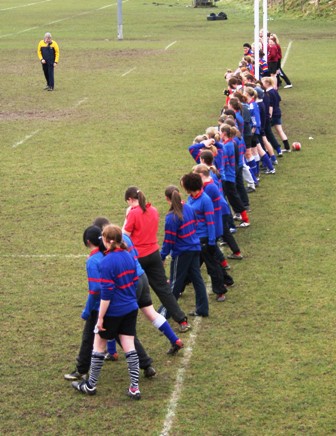
The UK sports system: much to discuss if the future is to be secured
Does the Big Society debate include sport?
While the government casts around for something that can offer some semblance of substance to their biggest policy idea, there is an argument that the UK sport system could benefit from a touch of Big Society thinking. Here someone who works within that system explains why and how it could be done.

The UK sports system: much to discuss if the future is to be secured
Since the new government has come to power, it is clear that the so-called “Big Society” is an important underpinning theme that will guide future decision-making. Clearly, there are a lot of different interpretations as to what the Big Society means and the sport and leisure sector does not appear to have formed any firm views to date. One of the problems as identified in The Times newspaper (Friday 23 July, page 23) is that “this is no small thing to say: it is a thing as big as a society. No wonder that every time people argue for the Big Society, its meaning seems to mutate to whatever they like most about it. It means mass volunteering, devolution of power, the removal of bureaucratic obstacles, and end to targets and it often seems the measurement of outputs.”
Given this context, let’s just take one element of the so-called Big Society and examine what it might mean for sport and the leisure industry: the removal of bureaucracy and the related issue that has bedeviled our industry for as long as I can remember, what to do with all the various quangos and sporting organisations that make up our sports system. We all know there is a long and complex history with regards to the evolution of our current sports system and whenever people start to try to understand our current set-up I am reminded of the quote: “Common sense is the knack of seeing things as they are, and doing things as they ought to be done.” (Harriet Beecher Stowe )
I wonder what a (common sense) commentator would observe about the current set up of sport and the related sports development system in the UK today? Here are some observations from the 1990s:
The first quote is a reflection of our historical attitude to sport and the lack of any well planned and systematic way of organising sport within our society. The second quote is very interesting. I wonder how we as people working in sports development might describe the sports system? Do you think people’s descriptions (of what the system is and how it works) would be the same or would it just be about their world (ie one aspect of the wider system)? I would imagine when taking a big-picture view (looking at all aspects, from PE and school sport through to national governing body talent development and high performance, plus important aspects relating to informal sport, recreational and physical activities) that this might end up like the description of the current tax system, which was recently reported to stretch into more than 11,000 pages. The system is so complex that even taxpayers with a consistent pattern of earnings consider it safer to hire professional help to complete their return. I wonder how a parent or someone who has little experience of sport and our sports system is able to make sense and navigate their way through the sporting world when we working in sport find many things hard to understand, rationalise and explain?
When looking at the evolution of our sport system we might also learn a lot from how the London Underground and canal systems developed. This is another message about our cultural aversion to doing things in a planned, organised and systematic way. Don’t you envy the Germans, who lately seem to have added a bite of flair and flexibility to the highly efficient way they organise sport, which was reflected by their football team’s performance at the 2010 World Cup? Of course, I hear you say, things have changed for the better with lots of lottery and exchequer-funded programmes: PESSCL, World Class, Active Schools, Active Communities, Step into Sport (please add as many programme as you like). And yes, we have had some systemic changes and transformations, especially in terms of high performance and in PE and school sport in recent years which are to be welcomed. However, have we really addressed the issues of systemic change across the sporting landscape in terms of:
We still have a lot of spaghetti clogging our overly bureaucratic sports system, a plethora of different overlapping organisations, more partnership agreements, performance indicators and targets than we know what to do with… and that’s only in England. And most important of all, this complexity creates massive challenges for everyone who is trying to establish efficient distribution systems and clear pathways for all people involved in sport and physical activity. The hard reality that we face is that it is often mission impossible for many of our sports to create clear pathways via programmes for participants, teachers, coaches, volunteers and officials when the system that they are trying to plug into is in many respects dysfunctional.
So what is the solution? Faced with current budget cut backs, the natural human reaction is to defend and retreat into saving what each organisation thinks are the key aspects of their work. This is a natural reaction but one that is guaranteed to make the current system even more crocked. What about a bit of creative and innovative thinking combined with grasping the bull by the horns? We need a fundamental root-and-branch reform of our sports system so that the landscape is decluttered and all key players understand the big picture of: who funds whom for what’ who does what in terms of policy development, strategic planning, operational delivery; who monitors and reviews the effectiveness of the system; and, most importantly, how key agencies and individuals collaborate to meet common goals and outcomes.
In summary, we need to look long and hard, not just at funding cuts across the board for the current sports system infrastructure but to critically examine how we can do things very differently to create a sports system that is clear to understand and engage with, not only from an end user/consumer perspective but also for the sanity of those work in the system (who, it must be said, are doing a sterling job of making the best of a bad job). Our current sports system, like our football team, is worn out, crocked and unable to deliver the things that really matter. So let the Big Society debate include the future of our sports system and streamlining our currently overly bureaucratic way of doing business.
Our man on the inside of the UK sport system has requested anonymity. Just this once we were happy to assent.
The Leisure Review, September 2010
© Copyright of all material on this site is retained by The Leisure Review or the individual contributors where stated. Contact The Leisure Review for details.
Download a pdf version of this article for printing
